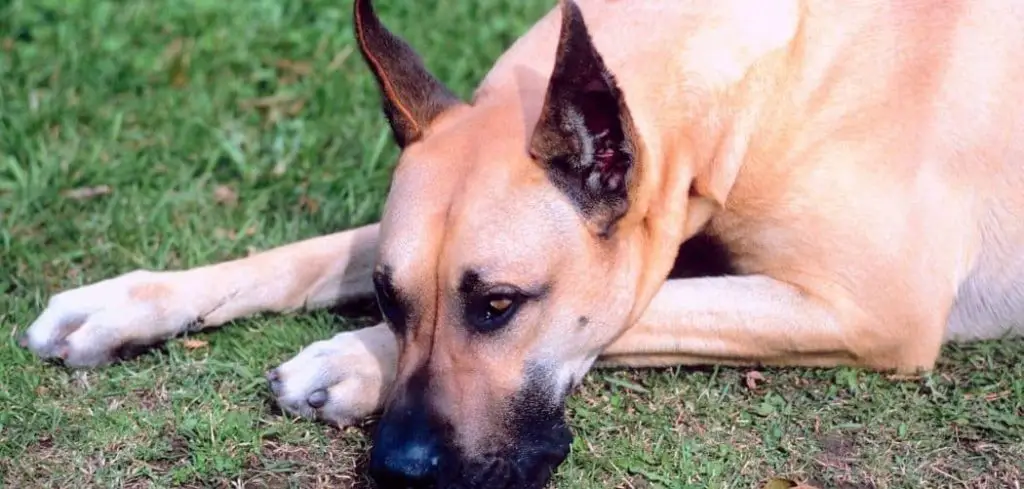Finding mucus in dog poop after constipation can be worrying for any dog owner. Constipation already signals digestive discomfort, but the addition of mucus in the stool raises further concern about what might be happening inside a dog’s gut.
We outline the common causes of mucus in a dog’s poop after constipation, what you can do at home, and when to seek veterinary help.
Table of Contents
Mucus in Dog Poop After Constipation — Why It Happens
Mucus in a dog’s stool after constipation often points to irritation or inflammation within the intestines.
Constipation can strain the colon, leading to excess mucus production as the body attempts to protect and lubricate the digestive tract. Sometimes this mucus is a temporary response, but in other cases, it may signal underlying issues like colitis, dietary sensitivity, dehydration, or even infections.
Dogs with ongoing constipation followed by mucus-filled stools may need veterinary attention to identify the root cause.

Mucus in Dog Poop After Constipation: Common Causes
Irritation From Straining
When a dog is constipated, they may push hard to pass stool. This straining irritates the lining of the colon and rectum. As a result, the intestines produce extra mucus to help ease the passage of stool.
Owners may see thick strands of slime coating the stool or patches of jelly-like mucus afterward. While this may resolve once constipation is relieved, repeated irritation can indicate chronic digestive problems that need attention.
Read more: Mucus in Dog Poop and Not Eating (Here’s Why)
Colitis (Inflammation of the Colon)
Constipation sometimes triggers or worsens colitis, an inflammation of the large intestine. Colitis causes the colon to produce excessive mucus, which may be seen after hard stools finally pass.
Dogs with colitis may also show signs of diarrhea alternating with constipation, urgency to defecate, or small amounts of stool with mucus. Left untreated, colitis can become chronic and painful for the dog.
Dietary Indiscretion or Food Sensitivity
If a dog eats something unusual, spoiled, or irritating to their digestive system, constipation may follow. Once stool passes, the body may coat it with mucus as a protective response to dietary upset.
Food sensitivities can have a similar effect. Constipation may alternate with loose stools, often accompanied by mucus. If mucus appears frequently after constipation, diet may be a key factor worth investigating.
Dehydration
Dogs that are dehydrated produce harder stools that are difficult to pass. This straining can trigger excess mucus production as the intestines try to lubricate the stool.
Dehydrated dogs may show dry gums, lethargy, or sunken eyes in addition to digestive changes. Without correction, ongoing dehydration can worsen constipation and mucus production, making bowel movements painful and irregular.
Intestinal Parasites
Parasites such as whipworms or giardia can inflame the intestinal lining, leading to both constipation and mucus-coated stools. While worms often cause diarrhea, they can also disrupt normal digestion and make stools irregular.
If a dog shows mucus in stool after constipation along with weight loss, bloating, or scooting, parasites may be a contributing cause. A vet can confirm this with a fecal test.
Stress or Anxiety
Stress can disrupt normal digestion in dogs, leading to alternating constipation and loose stools with mucus. Moves, new pets, boarding, or routine changes may all impact gut health.
In stressed dogs, mucus often appears after constipation resolves, as the gut remains inflamed from irregular motility. Identifying and reducing stressors can help restore normal bowel patterns.
What to Do If Your Dog Is Passing Mucus in Poop After Constipation
If a dog passes mucus after constipation, the first step is to assess hydration. Offering fresh water and possibly adding water to food can help soften stools going forward. Feeding a balanced diet with fiber—such as pumpkin or vet-approved fiber supplements—may support smoother bowel movements.
Gentle exercise, like walking, encourages healthy digestion. Monitoring your dog’s stool for recurring mucus is also important. If mucus is occasional and your dog otherwise seems comfortable, it may be a temporary irritation.
However, if constipation returns frequently or mucus continues to appear, a vet visit is necessary to rule out conditions such as colitis, infections, or parasites.
When to Call or Visit Your Vet
Call your vet if mucus in dog poop after constipation happens more than once, or if it’s paired with blood, vomiting, lethargy, or loss of appetite. These signs suggest a more serious gastrointestinal issue.
Seek veterinary care immediately if your dog strains without producing stool, as this could signal a dangerous blockage. Chronic constipation or alternating constipation and diarrhea also require prompt evaluation.
If your dog is old, has pre-existing health conditions, or is on medications, mucus in stool after constipation may need quicker attention to avoid complications.
Read more: Mucus in Dog Poop After Eating Chicken Bones (What it means)
Key Takeaway
Mucus in dog poop after constipation often reflects irritation of the colon or an underlying digestive problem.
While mild cases may resolve with hydration, diet adjustments, and monitoring, persistent or severe symptoms should never be ignored.
By keeping a close eye on your dog’s stool patterns and overall health, you can catch early signs of trouble and ensure they receive care when needed.
When in doubt, contacting your veterinarian is the safest step for your dog’s comfort and well-being.
